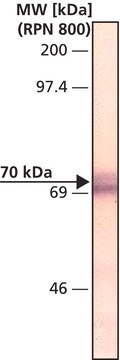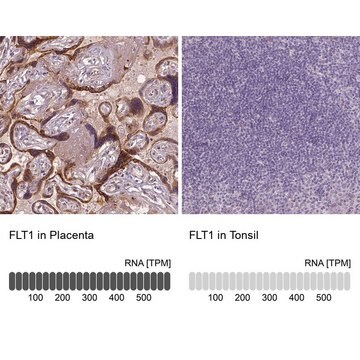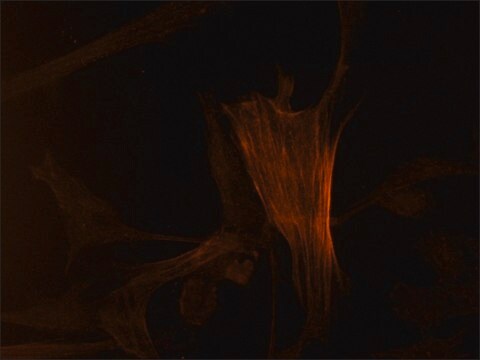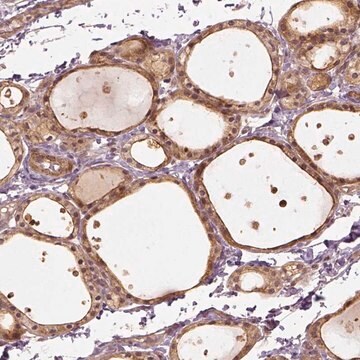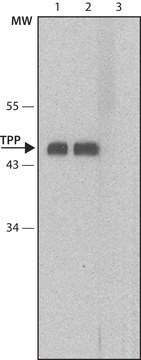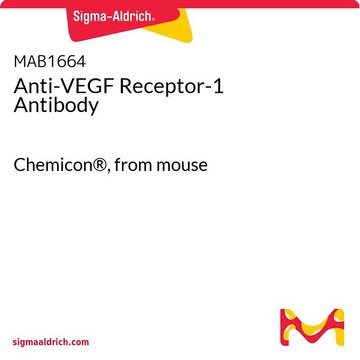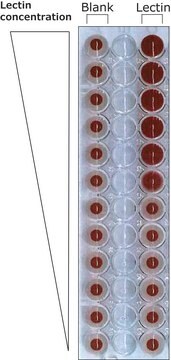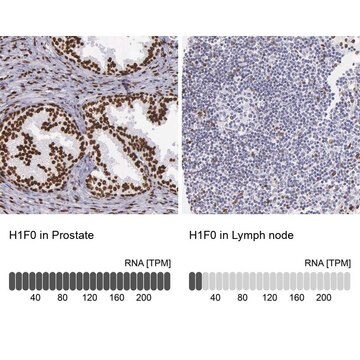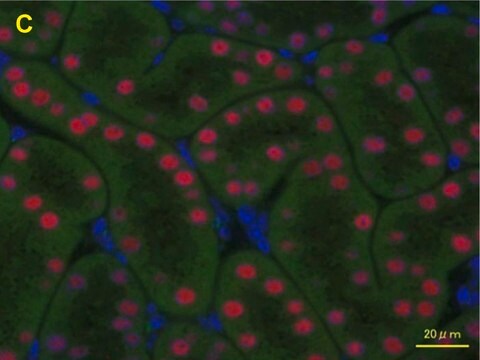推荐产品
生物源
mouse
共軛
unconjugated
抗體表格
tissue culture supernatant
抗體產品種類
primary antibodies
無性繁殖
FLT-19, monoclonal
包含
15 mM sodium azide
物種活性
human
技術
immunohistochemistry (frozen sections): 1:100 using human placenta
immunoprecipitation (IP): suitable
indirect ELISA: suitable
microarray: suitable
同型
IgG1
UniProt登錄號
運輸包裝
dry ice
儲存溫度
−20°C
目標翻譯後修改
unmodified
基因資訊
human ... FLT1(2321)
一般說明
Monoclonal Anti-VEGF Receptor-1 (Flt1 Receptor) (mouse IgG1 isotype) is derived from the FLT-19 hybridoma produced by the fusion of mouse myeloma cells and splenocytes from BALB/c mice immunized with a recombinant extracellular domain of VEGF Receptor-1 (Flt1 Receptor) of human origin. Vascular endothelial growth factor (VEGF), also called vasculotropin (VAS)1 and vascular permeability factor (VPF) 2 is a member of a family of endothelial cell mitogens and angiogenic factors. VEGF is a homodimeric heparin-binding glycoprotein. VEGF binds to two structurally similar receptor tyrosine kinases; Flt15 (fms-like tyrosine kinase 1, also termed VEGF Receptor-1, VEGF-R1) and KDR6 (kinase-insert domain containing receptor, also termed VEGF-R2). Flt1 is predominately expressed in human placenta and human vascular endothelial cells, while KDR is more widely expressed in all vessel-derived endothelial cells but low in human and fetal bovine placenta.
Mouse monoclonal clone FLT-19 anti-Vascular Endothelial Growth Factor Receptor-1 antibody recognizes the extracellular domain of human VEGF Receptor-1 molecule (Flt1 Receptor). The antibody does not recognize VEGF Receptor-2 (KDR), VEGF receptor-3 (sFlt4,) and PDGF-Rβ.
免疫原
recombinant human extracellular domain of VEGFR-1.
應用
Monoclonal Anti-Vascular Endothelial Growth Factor Receptor-1 antibody produced in mouse has been used in:
- immunofluorescence labelling
- enzyme-linked immunosorbent assay (ELISA)
- immunohistochemistry
- immunoprecipitation
Mouse monoclonal clone FLT-19 anti-Vascular Endothelial Growth Factor Receptor-1 antibody may be used for the localization of VEGF-R1 using various immunochemical assays such as ELISA, immunoblotting, immunocytochemistry, immunohistochemistry, and immunoprecipitation. Antibodies that react specifically with VEGF receptors are useful for the study of the specific differential tissue expression and intracellular localization of the receptor in normal and neoplastic tissue.
生化/生理作用
The mitogenic activity of VEGF appears to be stimulated by specific VEGF receptors (160-200 kDa) which can be found on the surface of various endothelial cells. VEGF binds to two structurally similar receptor tyrosine kinases; Flt1 (fms-like tyrosine kinase 1, also known as VEGF Receptor-1 (VEGF-R1), and KDR (kinase insert domain containing receptor, also known as VEGF-R2). Studies using KDR and Flt1 stably transfected endothelial cell lines have shown that these two receptors exhibit different affinities to VEGF and mediate different responses. KDR/Flk1 does not respond to placental growth factor (PlGF), a VEGF related growth factor, while Flt1 binds PlGF specifically. Flt1 is predominately expressed in human placenta and human vascular endothelial cells. Both VEGF receptors (KDR and Flt1) are upregulated in human fetal and adult kidney.
Vascular endothelial growth factor (VEGF) stimulates the proliferation of endothelial cells isolated from both small and large vessels.
免責聲明
Unless otherwise stated in our catalog or other company documentation accompanying the product(s), our products are intended for research use only and are not to be used for any other purpose, which includes but is not limited to, unauthorized commercial uses, in vitro diagnostic uses, ex vivo or in vivo therapeutic uses or any type of consumption or application to humans or animals.
未找到合适的产品?
试试我们的产品选型工具.
訊號詞
Warning
危險聲明
危險分類
STOT RE 2
儲存類別代碼
10 - Combustible liquids
水污染物質分類(WGK)
WGK 3
Real-time ligand binding of fluorescent VEGF-A isoforms that discriminate between VEGFR2 and NRP1 in living cells
PeachnCJ, et al.
Cell Chemical Biology, 25(10), 1208- 1218 (2018)
Vascular endothelial cell growth factor (VEGF), an emerging target for cancer chemotherapy
Shinkaruk S, et al.
Current Medicinal Chemistry. Anticancer Agents, 3(2), 95-117 (2003)
M Simon et al.
Journal of the American Society of Nephrology : JASN, 9(6), 1032-1044 (1998-06-11)
Vascular endothelial growth factor (VEGF) has an important function in renal vascular ontogenesis and is constitutively expressed in podocytes of the adult kidney. The ability of VEGF to be chemotactic for monocytes and to increase the activity of collagenase and
A Sawano et al.
Blood, 97(3), 785-791 (2001-02-07)
Flt-1, also known as vascular endothelial growth factor receptor 1 (VEGFR-1), is a high-affinity tyrosine kinase receptor for VEGF and is expressed almost exclusively on vascular endothelial cells. As an exception, Flt-1 transcript was recently found to be expressed in
Chloe J Peach et al.
Cell chemical biology, 25(10), 1208-1218 (2018-07-31)
Fluorescent VEGF-A isoforms have been evaluated for their ability to discriminate between VEGFR2 and NRP1 in real-time ligand binding studies in live cells using BRET. To enable this, we synthesized single-site (N-terminal cysteine) labeled versions of VEGF165a, VEGF165b, and VEGF121a.
我们的科学家团队拥有各种研究领域经验,包括生命科学、材料科学、化学合成、色谱、分析及许多其他领域.
联系技术服务部门